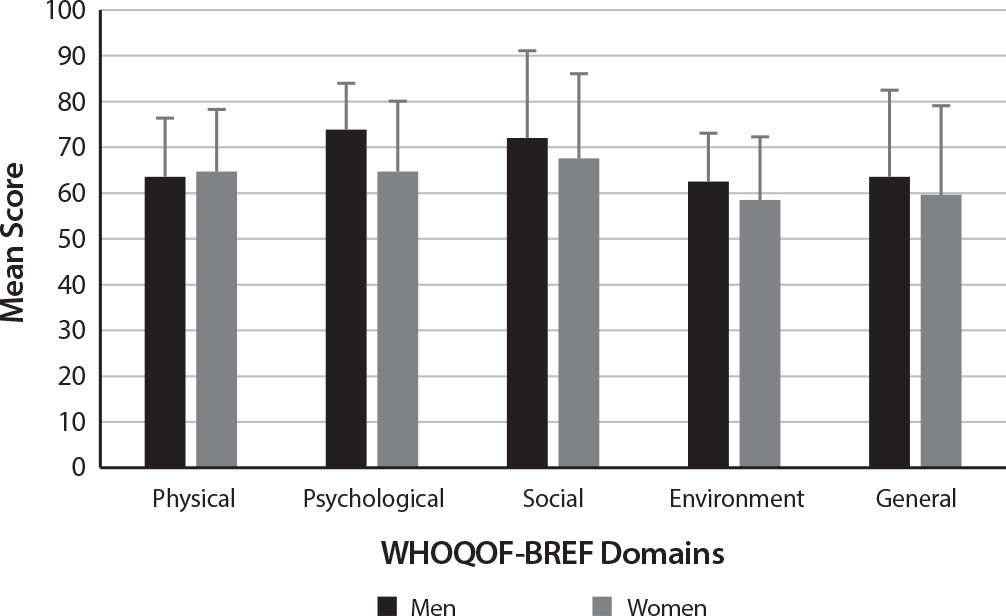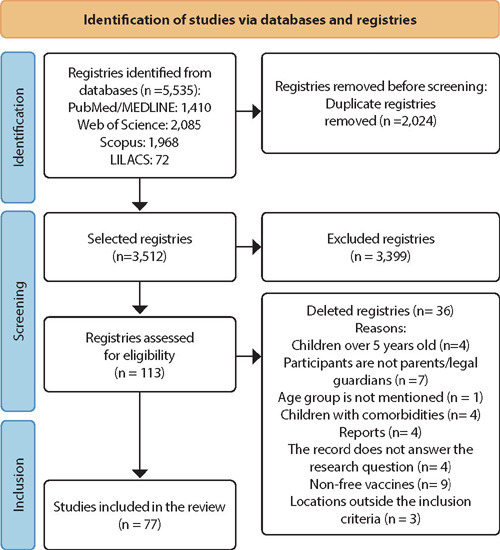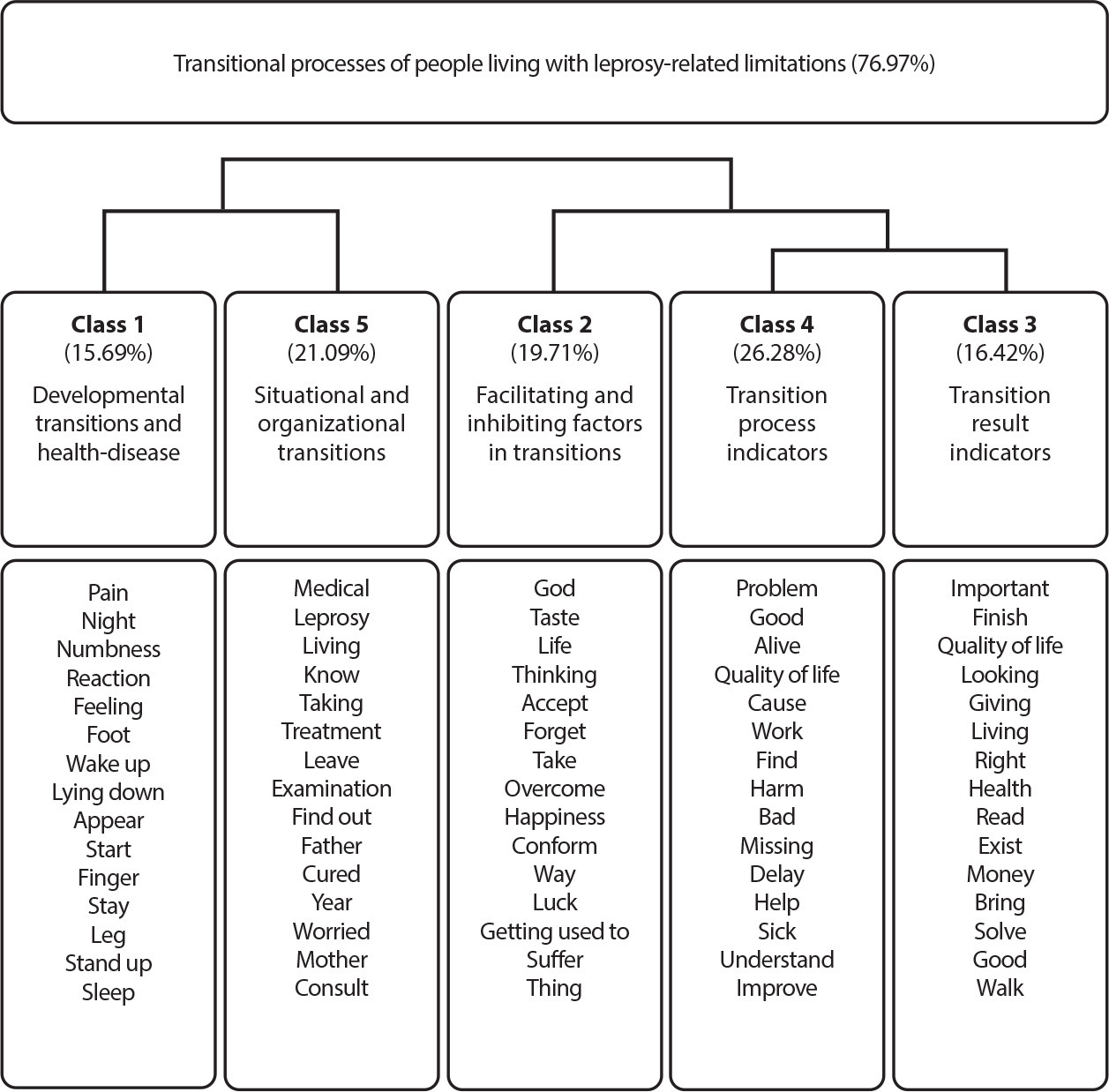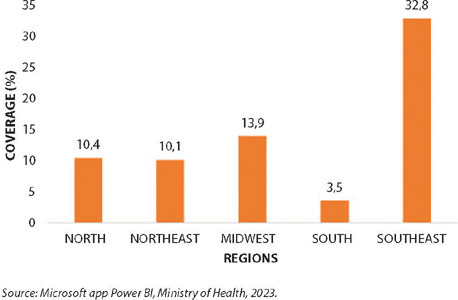-
ORIGINAL ARTICLE09-06-2024
Adherence to sepsis protocol in a high-risk maternity reference center
Revista Brasileira de Enfermagem. 2024;77(4):e20230453
Abstract
ORIGINAL ARTICLEAdherence to sepsis protocol in a high-risk maternity reference center
Revista Brasileira de Enfermagem. 2024;77(4):e20230453
DOI 10.1590/0034-7167-2023-0453
Views0See moreABSTRACT
Objective:
To describe the adherence to the sepsis protocol by obstetric nurses in the obstetric triage of a high-risk maternity reference center.
Methods:
This was a quantitative, documental, and retrospective study involving 105 pregnant women treated in obstetric triage under sepsis criteria. Data were collected through electronic medical records using structured forms and were organized into tables employing descriptive statistics. This research adhered to ethical principles concerning human studies.
Results:
Of the checklists for initiating the SEPSIS protocol by obstetric nurses, 105 were identified. Regarding the protocol steps performed, lactate was collected in 97.1% of cases and blood cultures in 98.1%, antibiotic therapy was administered in 94.3%, and hydration was carried out in 51.4% of the cases.
Conclusion:
The initiation of the sepsis protocol for all women meeting the criteria was confirmed. However, the steps were not fully implemented as recommended by the institutional protocol, and the recommended broad-spectrum antibiotic was not administered.
-
ORIGINAL ARTICLE09-06-2024
Physical and psychological changes of the COVID-19 infodemic by the older adult population
Revista Brasileira de Enfermagem. 2024;77(4):e20230339
Abstract
ORIGINAL ARTICLEPhysical and psychological changes of the COVID-19 infodemic by the older adult population
Revista Brasileira de Enfermagem. 2024;77(4):e20230339
DOI 10.1590/0034-7167-2023-0339
Views0See moreABSTRACT
Objective:
to analyze the physical and psychological changes of the COVID-19 infodemic for the older adult population of Rio de Janeiro.
Method:
a cross-sectional, web-based survey to find out about access to news and information about COVID-19 among older adult in Rio de Janeiro, between July and December 2020. Univariate analysis and bivariate analysis were carried out using non-parametric statistical methods.
Results:
390 older adults took part, predominantly female (75.1%), aged between 66 and 75 (35.4%), married (51.0%), white (60.3%), owning their own home (81.8%), located in urban areas (91%), with complete or incomplete primary education (31.8%) and retired or pensioners (79.2%). Younger people were significantly affected both physically and psychologically by social networks when compared to television (<0.001).
Conclusion:
Physical and psychological changes from exposure to information about COVID-19 have affected the lives of the older adult, having an impact on this population.
-
ORIGINAL ARTICLE09-06-2024
Nursing Process implementation in a gerontogeriatric context: qualitative research
Revista Brasileira de Enfermagem. 2024;77(4):e20230465
Abstract
ORIGINAL ARTICLENursing Process implementation in a gerontogeriatric context: qualitative research
Revista Brasileira de Enfermagem. 2024;77(4):e20230465
DOI 10.1590/0034-7167-2023-0465
Views0See moreABSTRACT
Objective:
to describe Nursing Process implementation in a faith-based senior living community.
Method:
strategic action research with 19 nursing professionals and three managers of a faith-based senior living community. Implementation took place in four phases: diagnosis, planning, implementation and assessment. The data collected through semi-structured interviews and focus groups were subjected to discursive textual analysis.
Results:
the central categories were constructed: Nursing Process in faith-based senior living community: diagnosis of knowledge and application; Nursing Process in faith-based senior living community: implementation; Nursing process in faith-based senior living community: assessment after its implementation.
Conclusion:
Nursing Process implementation made it possible to structure work management/organization, contributing to knowledge, organization and continuity of care for safety and professional support.
-
ORIGINAL ARTICLE09-06-2024
Development and content validation of a risk classification instrument
Revista Brasileira de Enfermagem. 2024;77(4):e20230502
Abstract
ORIGINAL ARTICLEDevelopment and content validation of a risk classification instrument
Revista Brasileira de Enfermagem. 2024;77(4):e20230502
DOI 10.1590/0034-7167-2023-0502
Views0See moreABSTRACT
Objective:
Develop and validate the content of an instrument for patient risk classification in emergency services of Primary Health Care.
Method:
The study included two stages: item generation and content validity. A literature review and retrospective analysis of medical records were conducted to create the instrument items. The Content Validity Ratio (CVR) was used to assess agreement among judges during content validation.
Results:
In the first and second rounds, 75 and 71 judges validated the risk classification instrument, respectively. The minimum adherence score for the latent variable item based on the final number of judges was 0.22 and 0.18; thus, 52 items, divided into three classification categories (red, orange, and yellow), were retained.
Conclusion:
The instrument was considered valid regarding clarity, relevance, pertinence, and agreement regarding the severity indicated in the item.
-
REVIEW08-30-2024
Impact of financial toxicity on adults with cancer during the COVID-19 pandemic: an integrative review
Revista Brasileira de Enfermagem. 2024;77:e20240078
Abstract
REVIEWImpact of financial toxicity on adults with cancer during the COVID-19 pandemic: an integrative review
Revista Brasileira de Enfermagem. 2024;77:e20240078
DOI 10.1590/0034-7167-2024-0078
Views0See moreABSTRACT
Objectives:
to identify the repercussions of financial toxicity on the lives of adult cancer patients during the COVID-19 pandemic.
Methods:
an integrative review was conducted using the PubMed, Web of Science, Scopus, and Embase databases, as well as the Virtual Health Library portal, in March 2023.
Results:
out of 62 studies found, 13 were included for analysis. The primary repercussions of financial toxicity included difficulties in covering basic expenses such as food, housing, medication, transportation, and internet access; increased anxiety and concerns related to health and financial situations; reduction or absence of income; challenges in obtaining treatment or accessing healthcare services; rising expenses; and telemedicine as a less burdensome alternative.
Conclusions:
the pandemic has exacerbated financial toxicity; therefore, healthcare teams must recognize it as an adverse event of oncological treatment and understand its potential to affect various aspects of patients’ lives.

-
ORIGINAL ARTICLE08-30-2024
Risk of smoking cessation treatment dropout: a cohort to help (re)think care
Revista Brasileira de Enfermagem. 2024;77:e20230537
Abstract
ORIGINAL ARTICLERisk of smoking cessation treatment dropout: a cohort to help (re)think care
Revista Brasileira de Enfermagem. 2024;77:e20230537
DOI 10.1590/0034-7167-2023-0537
Views0See moreABSTRACT
Objectives:
to evaluate the relative risk of smoking cessation treatment dropout during its intensive phase.
Methods:
a retrospective and quantitative cohort study was developed from the electronic medical records of individuals who started smoking cessation treatment between 2015 and 2019 at a specialty clinic in a city in the interior of São Paulo, Brazil. The relative risk of dropping out of treatment was calculated using the Poisson regression model.
Results:
it was observed that out of the 396 (100.0%) individuals who started the treatment, 109 (27.5%) abandoned it before the end of the intensive phase. For each one-year increase in age, the risk of dropping out of smoking cessation treatment decreased by an average of 2%.
Conclusions:
the risk of dropping out of smoking cessation treatment is higher among younger individuals. It is necessary to rethink the care offered to younger adults to promote the continuity of treatment.

-
08-30-2024
Fatores determinantes para à hesitação vacinal contra a COVID-19 em brasileiros: estudo utilizando modelagem de equações estruturais
Revista Brasileira de Enfermagem. 2024;77:e20240112
Abstract
Fatores determinantes para à hesitação vacinal contra a COVID-19 em brasileiros: estudo utilizando modelagem de equações estruturais
Revista Brasileira de Enfermagem. 2024;77:e20240112
DOI 10.1590/0034-7167-2024-0112
Views0See moreRESUMEN
Objetivos:
investigar los factores que influyen en la vacilación ante la vacuna contra la COVID-19 entre los brasileños.
Métodos:
esta investigación empleó un enfoque observacional y analítico, utilizando una encuesta en línea. La recolección de datos se llevó a cabo en 2020 y el análisis de los datos se realizó utilizando el modelado de ecuaciones estructurales.
Resultados:
la prevalencia de la vacilación ante la vacuna fue del 27,5% (1182 individuos). Existe una correlación negativa entre la creencia en teorías de conspiración y la influencia social. Entre las diversas creencias asociadas con las intenciones de vacunación, solo las creencias en conspiraciones mostraron un valor predictivo significativo. Así, los resultados sugieren que las creencias personales impactan significativamente la vacilación ante la vacunación y también indican que la confianza en los órganos gubernamentales está inversamente relacionada con la vacilación.
Conclusiones:
la vacilación ante la vacuna emerge como un fenómeno multifacético influenciado por una amplia gama de factores, incluyendo las creencias personales, la confianza en los órganos gubernamentales y los sistemas de salud.
-
ORIGINAL ARTICLE08-30-2024
Factors associated with university students’ knowledge about HIV and pre- and post-exposure prophylaxis
Revista Brasileira de Enfermagem. 2024;77:e20240092
Abstract
ORIGINAL ARTICLEFactors associated with university students’ knowledge about HIV and pre- and post-exposure prophylaxis
Revista Brasileira de Enfermagem. 2024;77:e20240092
DOI 10.1590/0034-7167-2024-0092
Views0See moreABSTRACT
Objectives:
to analyze the factors associated with university students’ knowledge about HIV and pre- and post-exposure prophylaxis.
Methods:
a cross-sectional study was conducted with 503 university students from a southern state in Brazil; data were collected using a characterization tool and a questionnaire containing 16 statements about the topic; descriptive measures and Poisson regression models with robust variance were used for analysis.
Results:
the prevalence of adequate knowledge (i.e., scoring more than 12 correct answers) was 27.83%; students older than 24 years, enrolled in health-related courses, who had not engaged in sexual relations in the last quarter, with a history of rapid HIV testing, and who knew or had heard about the prophylaxes showed a higher likelihood of scoring more than 12 correct answers.
Conclusions:
generally, the knowledge of young people about HIV and its prophylaxes was found to be inadequate and influenced by sociodemographic, educational, and behavioral factors.

-
ORIGINAL ARTICLE09-06-2024
Reflective practice of nurse residents in the teaching-learning process in teaching hospitals
Revista Brasileira de Enfermagem. 2024;77(4):e20230540
Abstract
ORIGINAL ARTICLEReflective practice of nurse residents in the teaching-learning process in teaching hospitals
Revista Brasileira de Enfermagem. 2024;77(4):e20230540
DOI 10.1590/0034-7167-2023-0540
Views0See moreABSTRACT
Objective:
To analyze reflective practice in the teaching-learning process of nurses in residency programs in teaching hospitals in Minas Gerais, Brazil.
Methods:
Case study, based on the reflective practice framework, conducted in two teaching hospitals. Observation and interviews were conducted with first and second-year residents, and five participants were included for in-depth analysis, with their data subjected to frequency distribution analysis and Critical Discourse Analysis.
Results:
In 519 observed activities, elements of reflection were identified in 22.2%, especially active listening and expression of doubts. Discourses indicated practice as the best moment for teaching-learning due to its potential to generate reflections. Learning by doing and case discussion were considered potential strategies for reflective learning.
Conclusion:
Know-in-action reflection was evidenced as the predominant formative aspect for residents, with few opportunities for reflection on reflection-in-action.
-
ORIGINAL ARTICLE11-22-2024
Sociodemographic and occupational influences on health professionals’ quality of life
Revista Brasileira de Enfermagem. 2024;77(4):e20240010
Abstract
ORIGINAL ARTICLESociodemographic and occupational influences on health professionals’ quality of life
Revista Brasileira de Enfermagem. 2024;77(4):e20240010
DOI 10.1590/0034-7167-2024-0010
Views0See moreABSTRACT
Objective:
To analyze the sociodemographic and occupational influences on health professionals’ quality of life.
Method:
This descriptive-exploratory, cross-sectional, analytical, and quantitative study addressed 94 health workers, including nursing technicians, nurses, and physical therapists working in Intensive Care Units in a town in the extreme south of Brazil in 2023. The student’s t-test and Spearman correlation were used.
Results:
A significant positive correlation was found between being a woman and the psychological domain and between income and the social and environmental domain while working hours were inversely related to general QoL. Additionally, workload negatively impacted the physical, psychological, and general QOL, furniture negatively influenced the psychological domain, and equipment was negatively associated with the physical and psychological domain.
Conclusion:
The characteristics of the work environment interfere with several areas of quality of life.

-
REVIEW09-06-2024
Parents’ or legal guardians’ beliefs and attitudes about childhood vaccination: a scoping review
Revista Brasileira de Enfermagem. 2024;77(4):e20240126
Abstract
REVIEWParents’ or legal guardians’ beliefs and attitudes about childhood vaccination: a scoping review
Revista Brasileira de Enfermagem. 2024;77(4):e20240126
DOI 10.1590/0034-7167-2024-0126
Views0See moreABSTRACT
Objective:
to map scientific evidence about perceptions, beliefs, knowledge and attitudes of parents or legal guardians of children under 5 years of age regarding routine childhood vaccination.
Methods:
a scoping review, conducted in accordance with the JBI framework. The searches were carried out in the PubMed/MEDLINE, Web of Science, Scopus and LILACS databases. A total of 5,535 studies were returned and 77 were selected, which met the inclusion criteria.
Results:
perceptions related to interaction with healthcare professionals and services, with family organization and structure, with social interaction and public policies, cultural, religious and personal beliefs, knowledge about vaccination schedule, vaccination and immunization process and sources of information are the main factors mapped and which can positively or negatively influence parents’ or legal guardians’ attitudes towards vaccinating children.
Conclusions:
the findings allow us to identify factors related to parents’ perception and beliefs about childhood vaccination.

-
ORIGINAL ARTICLE09-20-2024
Predictor variables effect on the development of Burnout Syndrome in higher education professor
Revista Brasileira de Enfermagem. 2024;77(4):e20240132
Abstract
ORIGINAL ARTICLEPredictor variables effect on the development of Burnout Syndrome in higher education professor
Revista Brasileira de Enfermagem. 2024;77(4):e20240132
DOI 10.1590/0034-7167-2024-0132
Views0See moreABSTRACT
Objectives:
to correlate the development of Burnout Syndrome in higher education professors with the following variables: sociodemographic, economic, work, sleep pattern, level of anxiety and quality of life.
Methods:
observational, analytical, cross-sectional study with a quantitative approach. Data collection took place from August to November 2022, with 140 professors from a private higher education institution in the Western Brazilian Amazon.
Results:
professors who carried out activities outside institutional hours and who had sleep duration < 5 hours, presented lower scores in the personal fulfillment dimension of burnout, with (p=0.002) and (p=0.001), respectively. The higher the scores for the physical (p=0.001), psychological (p=0.000) and social relationships (p=0.002) domains of quality of life, the lower the personal fulfillment scores for the syndrome.
Conclusions:
through linear regression, it was evidenced that several variables explain the development of burnout. Institutional and governmental actions can minimize the negative influence of these variables.
-
ORIGINAL ARTICLE11-22-2024
Transitions experienced by people living with limitations resulting from leprosy: a research-care study
Revista Brasileira de Enfermagem. 2024;77(5):e20230229
Abstract
ORIGINAL ARTICLETransitions experienced by people living with limitations resulting from leprosy: a research-care study
Revista Brasileira de Enfermagem. 2024;77(5):e20230229
DOI 10.1590/0034-7167-2023-0229
Views0See moreABSTRACT
Objective:
to understand the transitional processes that affect the adaptation of people who live with limitations resulting from leprosy.
Methods:
This is a qualitative study based on the precepts of Transition Theory, mediated by care-research, with 24 people with limitations resulting from leprosy in an ex-hospital colony in Piauí. Semi-structured interviews were carried out. The interviews were analyzed using Iramuteq software.
Results:
the researched-caregivers experienced the four types of transitions, including feelings of fear, worry, loneliness, hopelessness, guilt and a tendency to hide the diagnosis. Breakdowns and resignation were revealed, with spirituality, adaptation to the new life situation and acceptance as facilitating conditions for coping with the transitional process, with a consequent improvement in quality of life.
Final considerations:
the transitional processes had a positive significance, since they contributed to adaptation and the achievement of quality of life.

-
ORIGINAL ARTICLE10-25-2024
Analysis of the vaccination situation against Mpox in people living with HIV/AIDS: an ecological study
Revista Brasileira de Enfermagem. 2024;77(5):e20230234
Abstract
ORIGINAL ARTICLEAnalysis of the vaccination situation against Mpox in people living with HIV/AIDS: an ecological study
Revista Brasileira de Enfermagem. 2024;77(5):e20230234
DOI 10.1590/0034-7167-2023-0234
Views0See moreABSTRACT
Objectives:
to analyze the vaccination situation against Mpox in people living with HIV/AIDS in Brazil.
Methods:
an ecological study on the vaccination status against Mpox in people living with HIV/AIDS (PLWHA) in Brazil. The data were collected in April 2023 through information from the Ministry of Health, using the “Microsoft app Power BI,” which is publicly accessible.
Results:
the data analysis revealed that in Brazil, 2,978 doses of the MVA-BN Jynneos Mpox vaccine were administered in PLWHA, resulting in a vaccination coverage of 18.3%, with the southern and southeastern regions showing the lowest and highest vaccination coverage, respectively. Gender-based evaluation showed a higher proportion of vaccinated males.
Conclusions:
we identified low vaccination coverage in all regions of Brazil, highlighting the need for intensified vaccination activities, especially for PLWHA.

-
ORIGINAL ARTICLE12-13-2024
Adaptation and implementation of a Nursing care protocol for children in the Amazon Region
Revista Brasileira de Enfermagem. 2024;77(5):e20230245
Abstract
ORIGINAL ARTICLEAdaptation and implementation of a Nursing care protocol for children in the Amazon Region
Revista Brasileira de Enfermagem. 2024;77(5):e20230245
DOI 10.1590/0034-7167-2023-0245
Views0See moreABSTRACT
Objectives:
to describe the process of implementing an adapted protocol for pediatric nursing care in a health unit located in a municipality in the Amazon Region.
Methods:
methodological research conducted in a basic health unit with four family health teams in the state of Rondônia, involving seven nursing professionals. Data collection occurred between October 2020 and April 2022, following the research phases: situational diagnosis, exploratory phase, protocol definition, implementation, and evaluation.
Results:
the outcome was the adaptation and implementation of a nursing care protocol for children.
Final Considerations:
the adaptation and implementation process can be an effective approach to improving care, strengthening nursing as a profession with a solid foundation in scientific and clinical evidence. This facilitates early problem identification and appropriate guidance, leading to better health outcomes for children.
-
ORIGINAL ARTICLE11-22-2024
Knowledge sharing: nurse managers’ practices
Revista Brasileira de Enfermagem. 2024;77(5):e20230287
Abstract
ORIGINAL ARTICLEKnowledge sharing: nurse managers’ practices
Revista Brasileira de Enfermagem. 2024;77(5):e20230287
DOI 10.1590/0034-7167-2023-0287
Views0See moreABSTRACT
Objective:
To analyze how management practices for sharing knowledge are developed in public hospitals in the context of nursing.
Methods:
Qualitative research, carried out with 15 nurse managers from six public hospitals, from July to September 2022. Data were collected through semi-structured interviews and analyzed according to content analysis and in a model for sharing knowledge at work.
Results:
Knowledge sharing in nursing occurs through intraand extra-organizational training (training, courses and events), use of digital communication tools (media and social networks) and individual and collective contact between professionals during the service (experiences, exchange of experiences and assessment feedback).
Final considerations:
Sharing knowledge is relevant to nursing work. To improve it, it must be understood that effective sharing occurs from person to person, in their daily practices, and must be conducted as a strategically planned process by nurse managers.
Search
Search in:
Nuvem de Tags
Enfermagem (930)Cuidados de Enfermagem (269)Atenção Primária à Saúde (239)Idoso (208)Educação em Enfermagem (151)Segurança do Paciente (150)Saúde Mental (145)Educação em Saúde (139)Estudos de Validação (131)Qualidade de Vida (104)Tecnologia Educacional (100)Promoção da Saúde (99)COVID-19 (91)Criança (91)Família (87)Enfermagem Pediátrica (86)Saúde do Trabalhador (86)Adolescente (85)Saúde Pública (82)Estudantes de Enfermagem (77)



